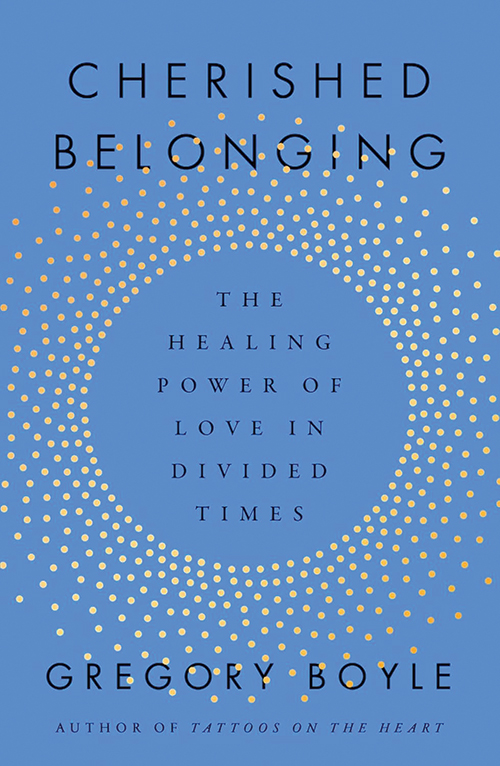
Cherished Belonging: The Healing Power of Love in Divided Times
Reviewed by Marty Grundy
September 1, 2025
By Gregory Boyle. Avid Reader Press, 2024. 224 pages. $30/hardcover; $14.99/eBook.
In nine short chapters, this book describes the way extravagant love creates a community in which everyone is cherished and belongs, and the way that differences that keep us separated become irrelevant. The author, Gregory Boyle, is a Jesuit priest who founded the largest gang intervention, rehabilitation, and re-entry program in the world: Homeboy Industries. But Boyle never uses the phrase “most successful,” explaining, “I always want us to become less outcome obsessed and more faithful to loving.”
The book, though, is not about Homeboy Industries, per se. Boyle says this book is different from his previous three in that it struggles to answer a question he often gets “about the alarming divide and this excruciating impasse in which we find ourselves at the moment.” He finds a quotation from Mother Teresa that points to a way to dissolve the deadlock: “If we have no peace, it is because we have forgotten that we belong to each other.” The final chapter sums up how unconditional love is “the fastest route” to creating a community that does away with fear and isolation.
Boyle’s theology insists God loves us, extravagantly and unconditionally. He tries to see everyone with the adoring eyes of God. His bedrock certainty is that everyone is basically good. Working with gang members in Los Angeles for over four decades, he loves those whom most of society has written off, and they also believed that they were “disposable.” But Boyle and the hundreds of men and women who have come through the Homeboy program have discovered deep within themselves their own goodness.
This solid core of goodness is, I think, analogous to what George Fox called “that of God.” Fox noticed that too often this inner core was chained down, imprisoned, and buried deep underground. Boyle uses a blindfold metaphor, borrowed from a former gang member named Joseph who once said that “life is just removing the blindfold” to see “goodness.” Trauma, wounds, and abuse prevent us from seeing the good inside, but when we find love and acceptance in community, Boyle says, “[t]he blindfold falls and we see what we’ve always been meant to see: the light in our soul.”
Boyle refuses to accept that there are good people and bad people, haters and lovers; there are just us. We are all good but in different stages of healing. He does not like to say “mental illness” because that seems to require a diagnosis in order to qualify. He prefers to say “no one healthy does this.” He points out that “no one healthy shoots up a subway train”; and “no one healthy storms the capitol or is a racist.” Explaining that someone is not healthy, he says, is not excusing the behavior but is the way that we make progress. Someone who is unhealthy can be healed and become healthy. Labeling someone as “bad,” a racist, or a hater does nothing to invite change.
Boyle is quite certain that these are not moral issues. Morality, for him, seems to be about rules and judgment. He says that morality divides us into those who are moral (like me) and those who are not (the others). He insists that Christianity is a way of life; it is not about rules. He could be talking about the ideal that Quakerism holds out for us: not about a set of “expectations” or unwritten rules but about a reorientation of the way we live, placing Divine Love at the center.
According to Boyle, the healing that erases acts of cruelty, hatred, and violence is based on first, an unshakeable acceptance of and trust in the goodness of each person, including oneself. Secondly, it is based on the unshakeable knowledge that we all belong to each other. Loneliness, the scourge of the twenty-first century, is not about being alone; it is about not belonging. We belong, however, not to a tribe but to a “village”: the entire group of all of us. As the Friends Committee on National Legislation sign proclaims: “Love Thy Neighbor (No Exceptions).”
Boyle writes about moving toward a cherishing community, an activity that could well be undertaken in a Friends meeting. In this movement, “we can witness the transformation from folks at the margins feeling, perhaps, tolerated, but then invited. Before long, they see they are being offered inclusion. But the final resting moment comes in belonging.” In Christian (or Quaker?) terminology, “We don’t just belong to the [Christian or Quaker] way; belonging is the way.” This is a book all Friends would probably enjoy and profit from. It might help our meetings become places of cherished belonging.
Marty Grundy, a member of the Religious Society of Friends, continues to hope it will be a vibrant, living community of cherished belonging for all who enter. She belongs to Wellesley (Mass.) Meeting.



Comments on Friendsjournal.org may be used in the Forum of the print magazine and may be edited for length and clarity.